
On Wednesday 4 August 2021, folks from across the financial markets industry including fund managers, investment platform operators, and regulators came together in Auckland’s Q Theatre to witness industry leaders partake in The Great FMA Debate. The moot of the debate was:
Investors are better off using experienced advisers than trying to DIY
It’s an important topic, with over 600,000 kiwis signed up to DIY investment platforms like Sharesies, InvestNow, and Hatch. Are these investors making bad investments and leaving money on the table by shunning the services of an expert adviser? In this article I’ll be covering what I learnt in the debate, and sharing my thoughts on the topic.
This article is not endorsed or sponsored by the FMA or any of the debate’s participants, is my personal interpretation of the event’s content, and is not to be considered as investment advice.
1. Key takeaways from the debate
Background
The very first Great FMA Debate was held in February 2020, with investment industry heavyweights arguing over whether Passive management gives investors the best outcome. You can check out that debate in the YouTube video below:
The Great FMA Debate returned in August 2021, with the topic Investors are better off using experienced advisers than trying to DIY – an especially relevant one as DIY investment platforms have had an explosion of new customers since the first FMA debate, as a result of the pandemic.
The teams
Representing the affirmative side (in support of using experienced advisers), we had:
- Andrew Bascand, Managing Director, Harbour Asset Management
- Helen Skinner, Head of Emerging Wealth, Craigs Investment Partners
- Chloe Robertson, Financial Adviser, Certus
Representing the negative side (in support of DIY investing), we had:
- Sonya Williams, Co-Founder & 3EO, Sharesies
- Kristen Lunman, Co-Founder & General Manager, Hatch
- Anthony Edmonds, Founder & Managing Director, InvestNow
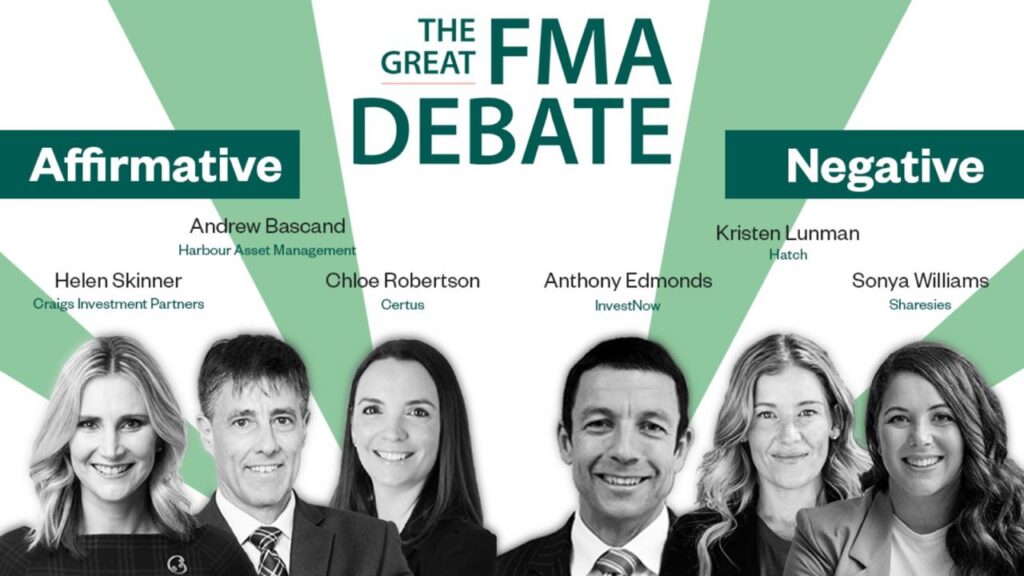
What a lineup of industry professionals! This was certainly going to be an awesome event.
The judges
The winning team was to be decided by a panel of three judges (unlike 2020’s debate which was judged by the audience):
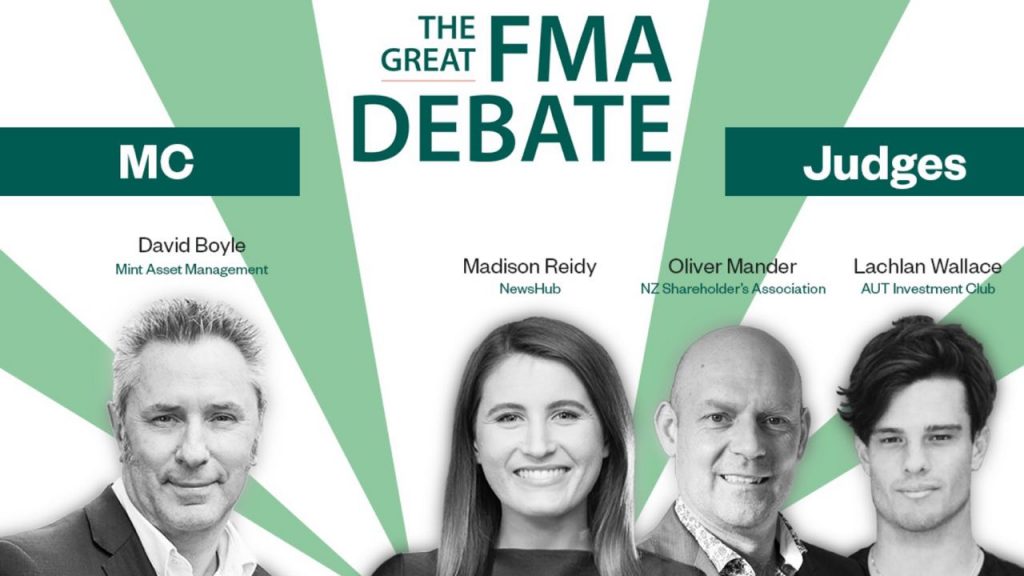
The key points of the debate
Here are the key themes from each of the teams:
Affirmative
DIY platforms are only good for playing and learning. It’s fine to use them as a hobby or to channel your inner “Wolf of Wall Street”, but ultimately an adviser will help you safeguard your money and make you better off. Just like you wouldn’t DIY your own house, you shouldn’t DIY building your wealth.
If you want to play with your money, there are many sandpits you could play in (referring to the negative team). You would DIY build your sandpit, but would you DIY build your own house?
Andrew Bascand
DIY investors substantially underperform the market. By 5% per year according to data from the US.
[DIY is] a way to empower a generation because it’s faster, better, and I didn’t get it – more wealthy? No, I didn’t hear that. Will it make you better off? I didn’t hear that.
Andrew Bascand
DIY investors aren’t financially fluent. And they often get information they use to make investment decisions from poor sources such as Google (the same way people get their cooking recipes!) or social media (where there was a disproportionate amount of discussion about speculative or penny stocks). Meanwhile, advisers are experts who speak the language of investing, have extensively researched markets and products, and have experience understanding clients’ financial goals.
I’d just like to quote something that’s come from a DIY Facebook page, of a client that’s getting direct access to market. Now this client has said “I’m fairly new to investing. I’ve invested in one company, but I’m not getting much of a return. Am I assuming the more you invest, the better the return?”. I’m pretty sure this person needs some expert financial advice.
Helen Skinner
Lack of financial fluency will lead DIY investors to making mistakes. Such as being emotional or thinking short-term when investing. This can result in hopping on and off bandwagons, buying and selling assets purely because of their price volatility. The movement of $1.2 billion of KiwiSaver money from Growth to Conservative funds by 26-35 year olds during the pandemic is evidence of this. In contrast, advisers take a long-term view to investing.
So what happens when all these emotional, short-term, Facebook surfing, financial novices get on DIY platforms? Well they start trading – they buy, they sell, they think they know better. Which is great business for [the DIY lot] because all they hear is ching-ching, ching-ching, ching-ching every time it happens (in reference to earning brokerage fees).
Chloe Robertson
Negative
DIY investing is more accessible. People have previously felt they’ve been unable to invest, or that investing is just for the elite minority. DIY platforms have changed that, bringing in investors and money that advisers don’t want to deal with or wouldn’t have otherwise flown in to the financial markets (although Helen Skinner countered this point, noting that Craigs Investment Partners accepts clients with just $100).
I emailed [some advisers] last week asking what to do with the $10,000 inheritance that I’d received. Some implied we don’t waste your time unless you have $100,000, others told me to invest it with InvestNow. Most of them simply didn’t reply.
Kristen Lunman
DIY investing is convenient and engaging. We do so much digitally these days including banking and buying groceries, so investing should be the same. The convenience of DIY platforms has led to investing being more engaging and fun, getting more people interested in the financial markets. In fact 80% of investors feel more positive about investing since the launch of online platforms.
No paper, no forms, no telephone calls, you’re in the driver’s seat.
Sonya Williams
DIY investors can also be experts. New Zealand has always been a DIY nation with a can-do attitude. Investing doesn’t need to be as complex as advisers try to make you believe, and people are absolutely capable of understanding money, investing, and their goals. You don’t have to be a professional to invest well – even people who have access to the best advisers can underperform, as Anthony Edmonds argued in reference to this news.
There will always be a place for financial advisers in New Zealand – in Te Papa with the other relics of yesteryear.
Kristen Lunman
DIY investors tend to be rational. Why give away control of our hard-earned money, when we are a nation of educated risk takers, who know how to make the right investment decisions? People on DIY platforms tend to be buying and holding their investments even during market downturns. The typical Sharesies portfolio is pretty diversified, made up of 3 funds and 5 companies. DIY investors are building meaningful wealth, using their investment to fund their housing and retirement. These are all signs of sensible investing behaviour.
80% of [DIY invetors] are buy and hold investors, not day trading or doing those sorts of crazy things.
Anthony Edmonds
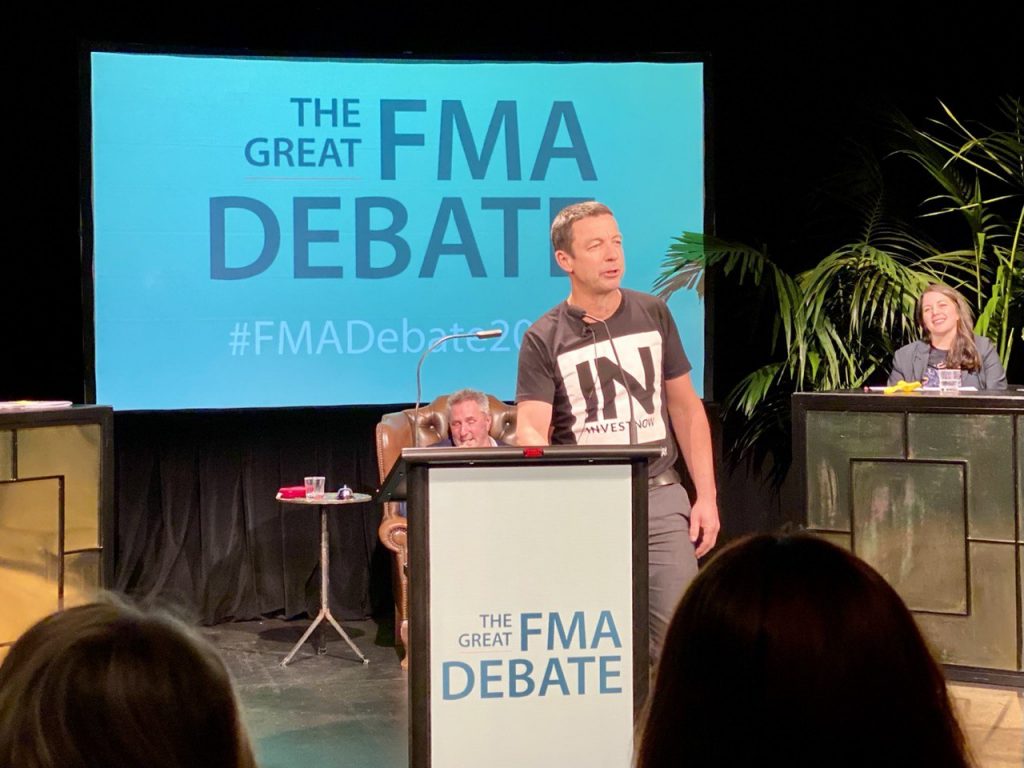
Other points of note
I was surprised that no one really covered the topic of fees, until the question was raised by judge Madison Reidy. I felt neither team addressed fees well (especially the negative team where they could have used this point to their advantage), apart from Helen Skinner who encouraged people to think of the value they’re getting in return for the fees (which from an adviser could be portfolio management, financial advice, or research on the markets and individual companies).
The winner
After a debate filled with strong and entertaining arguments, the judges announced the affirmative team as winners of the debate, voting 2-1 in their favour!
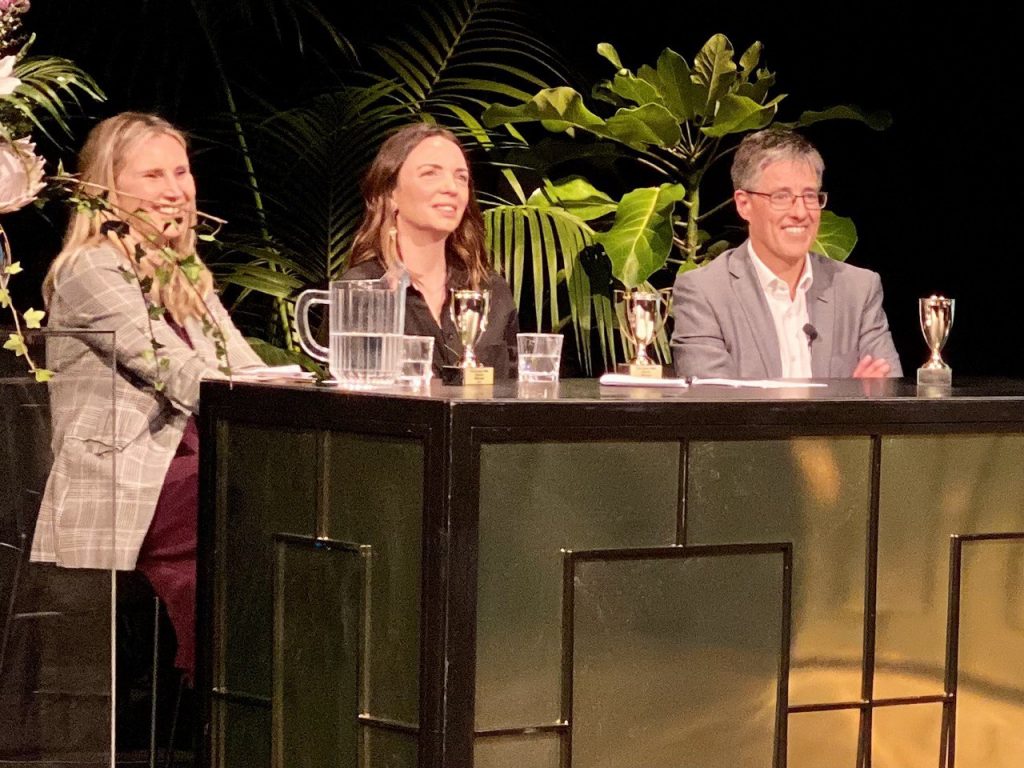
I agreed with the decision, as the affirmative team formed a cohesive argument (centring around the theme of DIY platforms being sandpits to play in), backed by evidence and examples. The negative team, lacked the same level of cohesiveness, evidence about how investors are better off in terms of financial outcomes, and failed to address the 20% of their investors who did engage irrational investing activity.
2. Did they try to sell anything?
Unlike most other investment events I’ve attended, there was no sales pitch. The event was organised by the Financial Markets Authority (FMA), who regulate the financial services industry. Regulators don’t tend to be considered the friendliest faces, or the most likeable brands in the investment world, but the FMA does some good work. They educate investors, help prevent scams, and promote industry transparency, which ultimately helps us keep our money safe.
The objective of FMA debates are to encourage discussion on important financial markets issues affecting Kiwis, and I think they did a fantastic job in achieving this. This year’s topic also tied in with some research that FMA commissioned to understand the behaviours of investors using DIY investment platforms, with the results backing up the negative team’s assertions that the majority (but not all) of their customers were long-term buy and hold investors. You can read the report yourself here.
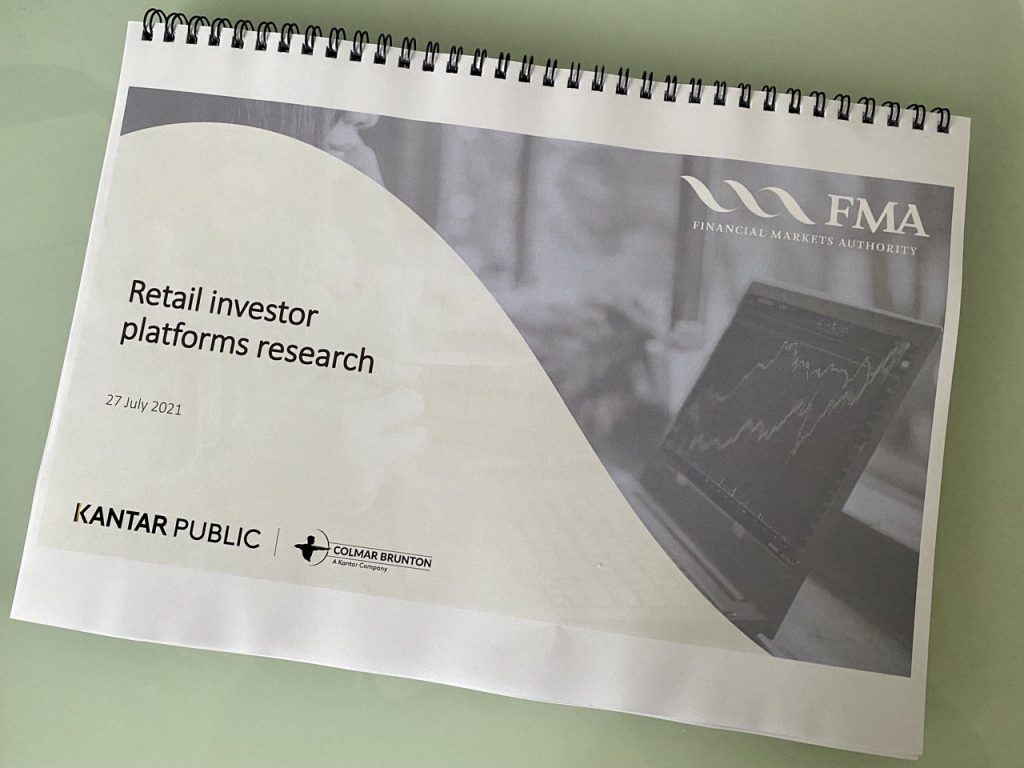
3. Was there any free food?
There was free beer and wine on offer, and a few canapés circulating around the venue which was ok (I would have preferred pies and sausage rolls).
4. My thoughts on the debate
The debate certainly gave me a lot to think about. I think there is a role to play for both advisers and DIY platforms, but most importantly I think they have a lot to learn from each other:
- Advisers are the experts in the industry. But they could be more approachable to smaller investors, be transparent on fees, and embrace digital solutions to make investing as convenient as possible.
- DIY platforms have given rise to hundreds of thousands of new investors. But they need to continue to educate investors on how to play in the sandpit to get started with investing, how to graduate from the sandpit and build meaningful wealth, and also how to approach getting professional financial advice if needed.
For investors, the ball is in your court.There is no right or wrong way to approach investing. Absolutely anyone can build meaningful wealth the DIY way if you are committed to learning. But remember the value an adviser could bring, in terms of forming a plan and portfolio to suit your financial goals, and coaching you through market ups and downs.
As for myself, I started as a DIY investor, and still am a DIY investor. But I am willing to admit that I would be better off right now (by tens of thousands of dollars) if I had started with an adviser – especially in the early stages of investing as I made many mistakes and found it difficult to get information on the various investment products, and platforms available to me. Although without DIY platforms, I’m not sure I’d have started investing in the first place or learnt so much from it.
Overall it was a very well organised debate, and most importantly, a fun and entertaining way to promote discussion about an important topic facing the industry and investors. So thanks to the FMA, the teams, the judges, and MC for putting on a great event. Check out the YouTube video below if you’re keen to watch the full debate:
Follow Money King NZ
Join over 7,500 subscribers for more investing content:
Disclaimer
The content of this article is based on Money King NZ’s opinion and should not be considered financial advice. The information should never be used without first assessing your own personal and financial situation, and conducting your own research. You may wish to consult with an authorised financial adviser before making any investment decisions.